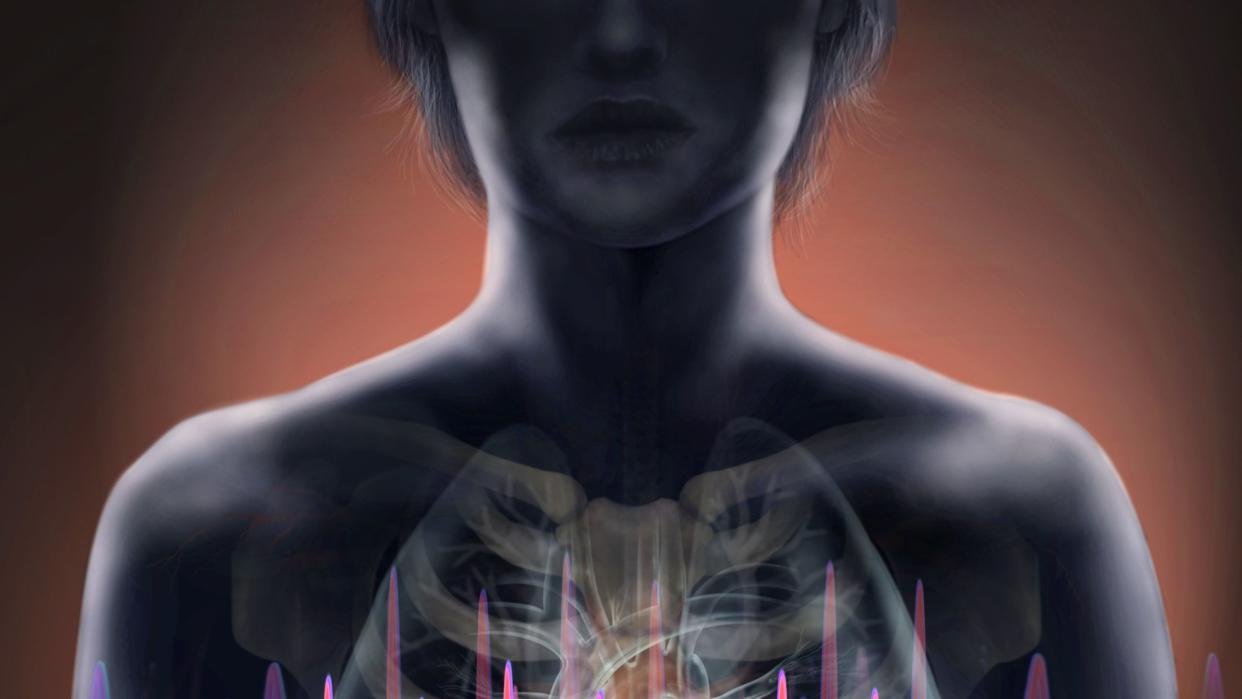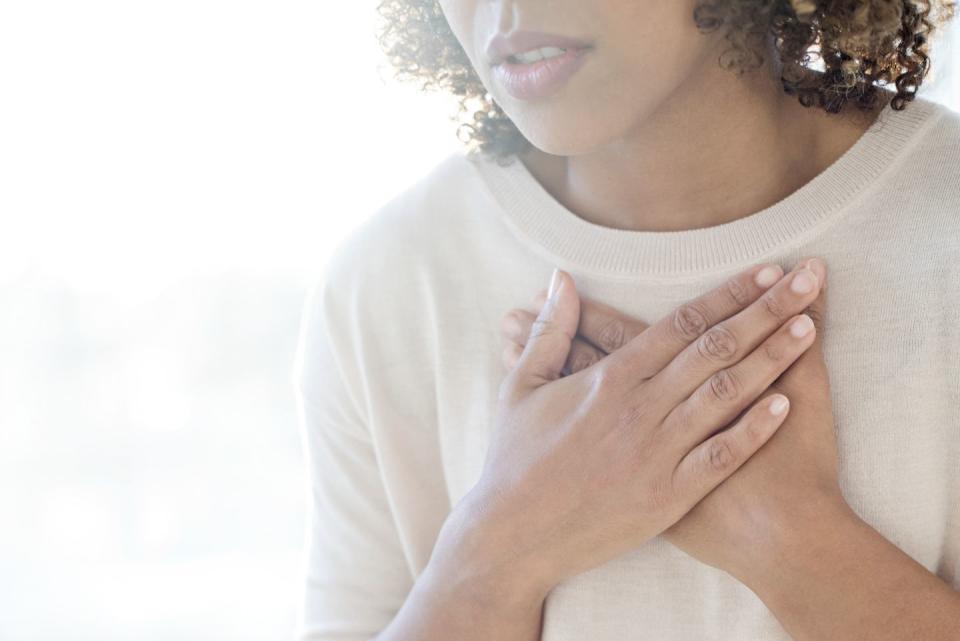Knowing These Surprising (and Subtle) Signs of a Heart Attack in Women May Save Your Life

When you think about a heart attack, you probably picture someone clutching their chest and falling to the ground with their breath knocked out of them. But what does a heart attack feel like for women? The truth is that some signs and symptoms of a problem are subtle and can therefore go unnoticed.
Although heart attacks are often thought of to be more common in men, heart disease is the number one killer of both men and women, accounting for about one in four deaths in women in the U.S., according to the Centers for Disease Control and Prevention.
But even though heart attacks are so common in women, there’s still one big problem: “There’s the perception that a woman would never think she’s having a heart attack, so she’s going to think it’s everything else but,” says Marla Mendelson, M.D., associate professor of cardiology at Northwestern Medicine.
Meet the experts: Holly Andersen, M.D., attending cardiologist at the New York-Presbyterian Hospital, Weill Cornell Medical Center and scientific advisor for Women’s Heart Alliance; Marla Mendelson, M.D., associate professor of cardiology at Northwestern Medicine; Erin Donnelly Michos, M.D., associate director of preventive cardiology at Johns Hopkins Medicine; and Amy Sarma, M.D., a cardiologist at Massachusetts General Hospital.
“Women more often take a wait-and-see approach—too busy to have a heart attack right now—and too many women are dying of their heart attacks,” says Holly Andersen, M.D., attending cardiologist at the New York-Presbyterian Hospital, Weill Cornell Medical Center and scientific advisor for Women’s Heart Alliance. “Women’s Heart Alliance is currently running a PSA to educate women about heart disease misdiagnosis, which is still all too common today. The campaign encourages women to know the symptoms and speak up for themselves.”
Remember, if you think you may be having a heart attack, it’s imperative to act fast and call 911. “We have a saying that ‘time is muscle,’” Dr. Anderson says.
What is a heart attack?
To recognize when it may be happening to you, it’s important to first understand what a heart attack usually is. “Essentially what’s happening is that the arteries in the heart are unable to provide sufficient blood flow to the working heart muscle, and most commonly this is due to atherosclerosis, this plaque that builds up in the arteries,” says Erin Donnelly Michos, M.D., associate director of preventive cardiology at Johns Hopkins Medicine.
And although plaque naturally builds up over time, a heart attack occurs when that plaque ruptures suddenly, says Dr. Michos. “The plaque ruptures, and a clot forms,” she says. “And there can be a complete obstruction of blood flow down the artery of heart.”
When that obstruction or blockage happens, it causes the heart muscle to begin to die. “This is why it’s an emergency, because if the heart muscle dies, it doesn’t repair itself,” says Dr. Michos. “Time is muscle.”

What does a heart attack feel like for women?

Indigestion
Because the heart sits on top of the stomach, it can be common to confuse a heart attack for simple indigestion. And, unfortunately, medicine has historically gotten this wrong for women, too.
“In 1991, there was actually a study that showed women who came into the emergency room with chest pain were treated differently than the men,” says Dr. Mendelson. “Women were sent home with antacids, and the men were sent to the cath lab,” she says.
And although medicine has now caught up significantly and has raised an increased awareness for heart disease in women, we as women still might hesitate to recognize a heart attack for indigestion if we’re feeling stomach pains.
“We still see women staying home because they have indigestion and treating themselves with antacid,” says Dr. Mendelson. So if you’re experiencing indigestion that feels abnormal or lasts for a more than a few minutes, get to a doctor right away.

Jaw and back pain
Everyone perceives pain differently, and everyone has different thresholds for pain. Because of that, it’s easy to confuse pain coming from the chest as pain coming from other areas, including the jaw or back.
“It’s not because the heart attack’s any different,” says Dr. Mendelson. “It’s the perception of the symptoms.”

Heartburn
Similar to indigestion, because of the positioning of the heart, it could be very easy to think you’re just having a simple case of heartburn. “The heart sits right on top of the esophagus in the stomach, so sometimes heartburn can feel like a heart attack, and a heart attack can feel like heartburn,” says Dr. Michos.
The important thing here is recognizing the time that passes. “If this is going on longer than five to seven minutes and you’re having ongoing discomfort that’s not going away with sitting and resting, and this is a new thing, this came on suddenly, you’ve never had it before, that’s sort of how a heart attack presents,” says Dr. Michos.

Shortness of breath
If you have shortness of breath after heavy exercise, that’s usually pretty normal. But if you’re experiencing shortness of breath when you’re just sitting on the couch, or if you’re unable to make it up the stairs, that could signal something more troublesome going on in your heart.
Even if that shortness of breath isn’t accompanied by chest pain, it could still signify a heart attack. “I always tell patients that if they think that something is wrong, they should seek immediate medical attention as everyone experiences a heart attack differently and the absence of chest pain does not mean that it’s not your heart,” says Amy Sarma, M.D., a cardiologist at Massachusetts General Hospital.

Left arm pain
Both men and women can experience any of these symptoms, but left arm pain is often what we think of as the classic heart attack symptom. That’s because, similar to jaw and back pain, your brain can’t decipher where the pain is coming from.
“Because the nerve endings all come into the spinal column at the same place—from the upper arm, from the chest—the brain can’t pick out that it’s actually happening in the heart,” says Dr. Mendelson. “For example, if you prick your finger, you know exactly where you’re poking your finger. You don’t have that in the chest.”

Nausea
Like indigestion, because the heart sits on top of the stomach, a heart attack can cause some nausea. “The heart’s your major, vital organ, and it’s not getting enough blood flow, and the heart muscle’s dying, and people feel incredibly sick,” says Dr. Michos.
But typically, a heart attack will cause a general sense of illness on top of that nausea, including feeling cold, lightheaded, and clammy. “It’s usually not just a little bit of nausea,” says Dr. Michos.

Chest pain
This is the most notorious sign of a heart attack: the feeling of an elephant sitting on your chest, or a feeling of sudden tightness near your heart. “It can have the pressure, the squeezing, the tightness in the chest,” says Dr. Michos. “That’s the typical presentation.” If you’re experiencing this, it’s important to get to a medical professional right away.

What should I do if I think I’m having a heart attack?
Call 911. “Not your doctor, not your spouse—you can alert them later. Call 911. Time is muscle. And when you get to the ER, tell them to evaluate your heart. Ask for an EKG and blood test. If you think you may be having a heart attack, tell them you are having chest pain because that triggers action,” says Dr. Andersen.

Heart disease risk factors for women
“Prevention is the key, and we know that the things that prevent heart attacks in men also prevent heart attacks in women,” says Dr. Mendelson. Heart disease plays a large role as well in preventing a heart attack.
According to the CDC, the following are heart disease risk factors for women:
High blood pressure (especially in pregnant women)
Smoking
Types of diabetes
Being overweight
Consuming an “unhealthy” diet
Lack of exercise
Excess drinking of alcohol
Stress
Depression
Early first period (before age 11)
Early menopause (before age 40)
Polycystic ovary syndrome
Gestational diabetes
Preterm delivery
Delivery of a low birth weight or high birth weight in an infant

When to see a doctor
If you have weird symptoms, or simply think something is up, don’t wait. Get help now. “The most common symptom of a heart attack for women is chest pain or pressure,” explains Dr. Anderson. “But 40% of women having a heart attack will not experience chest pain. They may feel jaw, back, or neck pain, shortness of breath, extreme fatigue, or experience nausea, heartburn—even vomiting.” Ultimately, “most know something is wrong—we want women to know it could be their heart—and to act. Call 911.”

You Might Also Like


